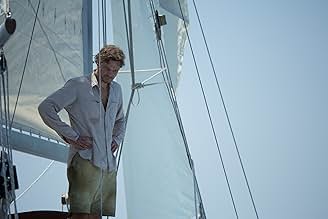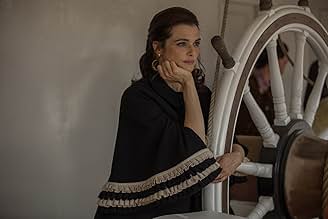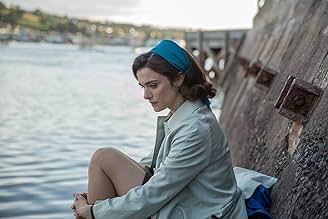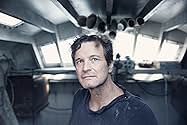NOTE IMDb
6,0/10
10 k
MA NOTE
La tentative désastreuse du navigateur Donald Crowhurst pour remporter la Golden Globe Race de 1968 se soldera par de faux comptes-rendus sur de déroulement de sa course autour du monde en s... Tout lireLa tentative désastreuse du navigateur Donald Crowhurst pour remporter la Golden Globe Race de 1968 se soldera par de faux comptes-rendus sur de déroulement de sa course autour du monde en solitaire.La tentative désastreuse du navigateur Donald Crowhurst pour remporter la Golden Globe Race de 1968 se soldera par de faux comptes-rendus sur de déroulement de sa course autour du monde en solitaire.
- Récompenses
- 1 victoire au total
Richard Braine
- Chamber Member
- (as Richard Blaine)
Avis à la une
I suppose any popular 101 minute treament of this story is going to struggle to explore the themes of male expectation, failure and isolation that are relevant to the Crowhurst story, and certainly for a film about being alone at sea for 7 months, we spend a lot time seeing pretty images of Teignmonth.
The script and pacing are rather generic in its box-ticking of events, the usual cliched news report voice overs and discussions in pubs chugging along the events in a necessary manner, while divorcing us from whatever Crowhurst experienced on his own, hearing of the travails of his competitors and how they variously piled new pressure upon his unfolding catastrophe. The second half of the film would have benefitted without showing any other characters at all. Of course his family were suffering from their hopes, of course his publicist and financier were taking advantage of him, but there was no of course about how Crowhurst's decent into madness led him to writing about 'cosmic beings'. The most intriguing part of the story remains untold, and it could only be examined through more isolation, more of the sea.
Beyond that, Colin Firth is miscast. Crowhurst was an eccentric, he was dashing and goofy at the same time, vigorously intelligent and utterly misguided, and Firth makes the whole terrible misadeventure look like the misspent Sunday afternoon of a Daily Telegraph reader. I suppose Firth was required for funding? Hardly his fault thoigh, but this role needed Hugh Bonneville, Martin Freeman, or a more left-field actor.
The script and pacing are rather generic in its box-ticking of events, the usual cliched news report voice overs and discussions in pubs chugging along the events in a necessary manner, while divorcing us from whatever Crowhurst experienced on his own, hearing of the travails of his competitors and how they variously piled new pressure upon his unfolding catastrophe. The second half of the film would have benefitted without showing any other characters at all. Of course his family were suffering from their hopes, of course his publicist and financier were taking advantage of him, but there was no of course about how Crowhurst's decent into madness led him to writing about 'cosmic beings'. The most intriguing part of the story remains untold, and it could only be examined through more isolation, more of the sea.
Beyond that, Colin Firth is miscast. Crowhurst was an eccentric, he was dashing and goofy at the same time, vigorously intelligent and utterly misguided, and Firth makes the whole terrible misadeventure look like the misspent Sunday afternoon of a Daily Telegraph reader. I suppose Firth was required for funding? Hardly his fault thoigh, but this role needed Hugh Bonneville, Martin Freeman, or a more left-field actor.
When I first saw this film, I really enjoyed it. Here's what I wrote:
"I'm sure there are elements here that most people can relate to, the pressure of pride, recognition, approval, acceptance, what it means to be a man, to impress, how far you have to go to prove yourself, and why. The whole story works as a metaphor for many relationships I have known, where the limbo strains communications (literally here with a radio he chooses not to use as much for fear of 'being found out'). The editing and use of flashbacks to weave together an impression of his emotional state is a great use of cinema. Its like an analogy of imposter syndrome, taken to the extreme."
I was so fascinated with the story, I read 'The Strange Voyage of Donald Crowhurst" and watched the documentary Deep Water. Then I saw The Mercy again. This time, the flatness of the film, the lack of effort, the pedestrian, workman hack-job sunday-afternoon-for-pensioners side of the writing/direction leaped out and made itself obvious. I couldn't believe I'd liked it so much before.
"I'm sure there are elements here that most people can relate to, the pressure of pride, recognition, approval, acceptance, what it means to be a man, to impress, how far you have to go to prove yourself, and why. The whole story works as a metaphor for many relationships I have known, where the limbo strains communications (literally here with a radio he chooses not to use as much for fear of 'being found out'). The editing and use of flashbacks to weave together an impression of his emotional state is a great use of cinema. Its like an analogy of imposter syndrome, taken to the extreme."
I was so fascinated with the story, I read 'The Strange Voyage of Donald Crowhurst" and watched the documentary Deep Water. Then I saw The Mercy again. This time, the flatness of the film, the lack of effort, the pedestrian, workman hack-job sunday-afternoon-for-pensioners side of the writing/direction leaped out and made itself obvious. I couldn't believe I'd liked it so much before.
- Colin Firth is actually very miscast. He doesn't have the persuasive, determined, forceful arrogance of the real Crowhurst. Firth comes across as gentle and unassuming, not desperate for approval and recognition.
- The descent into madness is SO tepid in the film. On reading the book, there are so many conflicts, pressures and uncertainties that gradually crush Crowhursts mind, leading to him writing 25,000 words about becoming a cosmic being. Firth's version is asking for forgiveness and saying sorry, as though perfectly sane. Its not the real story by any means, and gives a horrid reflection of how affected Crowhurst actually was by his predicament.
- Unforgivably, its actually very boring on a rewatch. There is no depth or subtlety. The true story is so multifaceted and tense, its amazing to that the film is quite as flat as it is.
In the 60's a guy decides one day that he should risk all he has to race around the world in a yacht.
This is his story.
The first half of the movie concerns itself with the technical, financial and emotional aspects of the trip.
There are some obvious hurdles to this proposed jaunt around the globe.
The main character lacks money, experience, time and the most rudimentary knowledge of sailing in the high seas.
Because of the stiff-upper-lipness of the period everyone is very optimistic and polite about what appears, at first hand, his obvious suicide mission.
The back end of the film is about the race.
Watching someone bob around on the sea in a tiny boat it turns out is very, very dull.
This cast do a grand job bringing the reserved characters to life; Rachel Weisz easily steals the show .
The film is non-judgmental, non-sensational and well crafted.
It is nice to watch something that hangs around in second gear; but saying that it does (ironically) make for quite a dry watch.
This is a perfect film for a Sunday when you feel like something serious but not too taxing.
This is his story.
The first half of the movie concerns itself with the technical, financial and emotional aspects of the trip.
There are some obvious hurdles to this proposed jaunt around the globe.
The main character lacks money, experience, time and the most rudimentary knowledge of sailing in the high seas.
Because of the stiff-upper-lipness of the period everyone is very optimistic and polite about what appears, at first hand, his obvious suicide mission.
The back end of the film is about the race.
Watching someone bob around on the sea in a tiny boat it turns out is very, very dull.
This cast do a grand job bringing the reserved characters to life; Rachel Weisz easily steals the show .
The film is non-judgmental, non-sensational and well crafted.
It is nice to watch something that hangs around in second gear; but saying that it does (ironically) make for quite a dry watch.
This is a perfect film for a Sunday when you feel like something serious but not too taxing.
....the documentary "Deep Water" does a better job, it's worth finding.
As many have mentioned before, the documentary "Deep Water" is better at telling the story than this film, but "The Mercy" still has its merits. The movie looks great for the most part in its 1960's setting, and the actors all do their jobs. I particularly liked David Thewlis and Rachel Weisz in their roles. Colin Firth is also good, but looks like a sad dog for much of the movie, even before his character gets into trouble in the beginning and eventually sets sail.
The movie almost rushes through the intro, with rapid speaking lines and stressed scenes that don't feel all that natural. This is actually a problem all the way through, as it never slows down enough for us to truly take in the isolation and loneliness that Donald Crowhurst (Colin Firth, that is) must have felt in real life. We spend too much time on land and too little time at sea. As with many other films, it's hard to translate human thoughts onto the big screen ("The Old Man and the Sea" must be the classic example of this), and "The Mercy" fails on this note more often than it succeeds.
I do, however, still recommend the film, because it is still a good movie with good actors, and it's worth watching. It's just a shame that it doesn't reach its full potential, with a fascinating story such as this one.
I haven't seen "Crowhurst" (produced at the same time as "The Mercy", but by a different studio), but I've heard that that one is a bit better. In the end, "Deep Water" seems to be the best choice, however.
UPDATE (8 November, 2018): I have now seen "Crowhurst", and I am not sure if it's better than "The Mercy". I gave both films six stars. They are very different, however, as "Crowhurst" is more of a low-budget, theatrical art house film. It is also a character study, rather than a story-driven movie. Because of this, I think both films are worth watching, for their own reasons. "Deep Water" tells the story better than either of them, however and is indeed the best choice to watch.
The movie almost rushes through the intro, with rapid speaking lines and stressed scenes that don't feel all that natural. This is actually a problem all the way through, as it never slows down enough for us to truly take in the isolation and loneliness that Donald Crowhurst (Colin Firth, that is) must have felt in real life. We spend too much time on land and too little time at sea. As with many other films, it's hard to translate human thoughts onto the big screen ("The Old Man and the Sea" must be the classic example of this), and "The Mercy" fails on this note more often than it succeeds.
I do, however, still recommend the film, because it is still a good movie with good actors, and it's worth watching. It's just a shame that it doesn't reach its full potential, with a fascinating story such as this one.
I haven't seen "Crowhurst" (produced at the same time as "The Mercy", but by a different studio), but I've heard that that one is a bit better. In the end, "Deep Water" seems to be the best choice, however.
UPDATE (8 November, 2018): I have now seen "Crowhurst", and I am not sure if it's better than "The Mercy". I gave both films six stars. They are very different, however, as "Crowhurst" is more of a low-budget, theatrical art house film. It is also a character study, rather than a story-driven movie. Because of this, I think both films are worth watching, for their own reasons. "Deep Water" tells the story better than either of them, however and is indeed the best choice to watch.
Le saviez-vous
- AnecdotesAt age 55, Colin Firth was 20 years older than Donald Crowhurst was when he set off on the Golden Globe race.
- GaffesWhen the Teignmouth Electron is leaving harbour, the yachts in the background have a stern shape that's about 40 years too modern.
- Citations
Sir Francis Chichester: A man alone on a boat is more alone than any man alive.
- ConnexionsFeatured in Projector: The Mercy (2018)
- Bandes originalesMaria Elena
Written by Lorenzo Barcelata
Performed by Los Indios Tabajaras
Meilleurs choix
Connectez-vous pour évaluer et suivre la liste de favoris afin de recevoir des recommandations personnalisées
- How long is The Mercy?Alimenté par Alexa
Détails
Box-office
- Budget
- 18 000 000 $US (estimé)
- Montant brut aux États-Unis et au Canada
- 29 538 $US
- Montant brut mondial
- 4 536 348 $US
- Durée
- 1h 52min(112 min)
- Couleur
- Mixage
- Rapport de forme
- 2.35 : 1
Contribuer à cette page
Suggérer une modification ou ajouter du contenu manquant




































